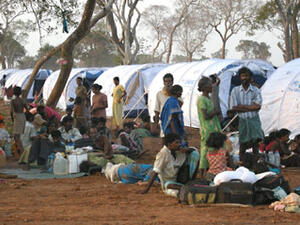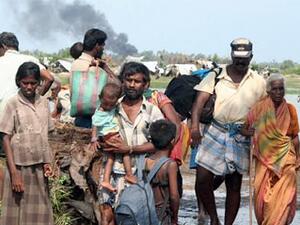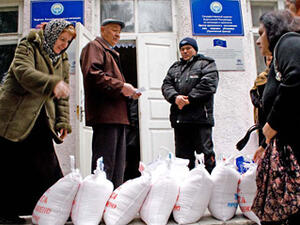UNHCR receives one-third of funding appeal for Iraq
UNHCR receives one-third of funding appeal for Iraq

UNHCR chief Ruud Lubbers checking supplies of relief items in Ahwaz, western Iran, in March 2003.
GENEVA, March 18 (UNHCR) - Against the spectre of a possible war in Iraq, the UN refugee agency today announced it has received more than one-third of the $60 million needed for its contingency plans in the region, where it has already pre-positioned relief supplies for nearly half of its working figure of 600,000 possible Iraqi refugees.
UNHCR needs $60 million - part of a joint appeal for $123 million by nine UN agencies and the International Organization for Migration announced on February 13 - for its initial contingency preparations for 600,000 refugees in the event of a conflict in Iraq.
Referring to the 600,000 figure at a press briefing in Geneva Tuesday, UNHCR spokesman Ron Redmond stressed, "This is not a prediction, but a working figure based on one of many possible scenarios. It allows us to plan our budgets, logistical requirements and staffing needs."
So far, UNHCR has received $21 million, including contributions in the last two days from Canada and the United Kingdom. At the same time, Australia and Norway said they would repay $1.8 million out of a $6 million loan the agency took from the UN Central Emergency Relief Fund.
UNHCR has spent $25.8 million on procurement, transportation and storage of non-food relief items, and on other preparedness measures in the region. As of Monday, it had pre-positioned emergency stocks for nearly 300,000 people in the region. It plans to have enough in place for 350,000 by the end of March.
Supplies continue to arrive and are being pre-positioned around the region, including in Iskenderun, Turkey; Kermanshah, Iran; and Aqaba, Jordan. UNHCR is also assembling information from a wide range of other partners in the region who have their own emergency stocks in place.
On UNHCR's presence in the region, Redmond noted that the agency has deployed about 30 additional international staff to countries surrounding Iraq in recent weeks. They join the 185 national and international staff already working in its 15 offices across the region. Seven emergency response teams are also on standby for deployment.
UNHCR chief Ruud Lubbers, who recently travelled to the region, has asked officials in each of Iraq's surrounding countries to keep their borders open in the event of war.
Redmond explained, "Iraq's neighbours would have primary responsibility for providing refugees with temporary protection and material assistance to lessen the effects of human suffering, and for security, including maintaining the civilian and humanitarian character of any refugee-hosting areas."
He added that in the event of refugee flows, UNHCR would focus primarily on its mandated international protection and advocacy role, which includes upholding basic refugee protection principles, particularly the principle of non-refoulement and access to asylum. The agency's staff would also conduct the registration of refugees together with the host governments.
UNHCR would also seek the continued protection of some 100,000 existing refugees in Iraq.
Depending on available resources, the refugee agency would support governments in providing essential services, including food, basic shelter, water, sanitation facilities, health care and clothing.
In Jordan, for example, UNHCR has sent supplies of tents, blankets, plastic tarpaulins, kitchen sets, mattresses, stoves, lanterns and hygiene supplies for 10,000 people to a Hashimite Charitable Society-managed warehouse in Ruwaished, about 60 km from the Iraqi border.
Besides helping regional governments cope with possible refugee flows, UNHCR is also working closely with their national Red Crescent Societies in conjunction with the International federation of Red Cross and Red Crescent Societies (IFRC) and the International Committee of the Red Cross (ICRC).









